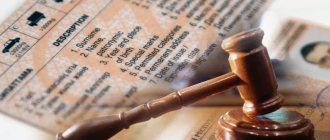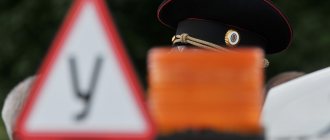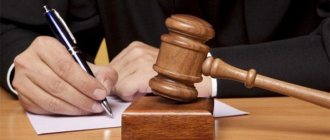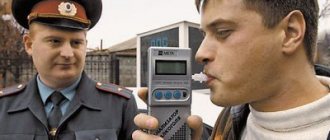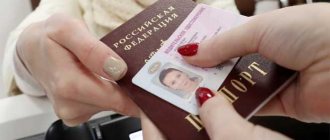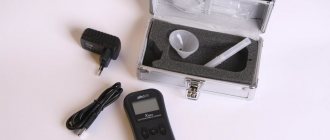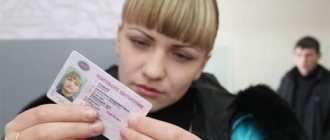It is prohibited by law to use a personal vehicle to travel after revocation of a driver's license. The period for suspending the validity of the license is determined by the court and indicated in the ruling.
Disobedience to the verdict may sooner or later come to light if the driver is stopped by an inspector during a traffic police raid. During the execution, the official will definitely ask you to provide him with not only the technical document for the car, but also a driver’s license.
Not every driver has the desire to switch to public transport, so they, despite the ban, continue to illegally use their own vehicle. And if the violator is caught, he will not escape punishment for driving without a driver’s license after deprivation. And what it will be like, read on.
Punishment for driving without a license after deprivation
Not a single meeting between the driver and the traffic police is complete without the inspector demanding to present a driver’s license and other required documents. If during the inspection of the driver's license it is found that the citizen's lack of rights is a consequence of a court hearing on deprivation of a driver's license, the violator faces one of the penalties specified in Part 2 of Article 12.7 of the Code of Administrative Offenses of the Russian Federation:
Attention! If you have any questions, you can chat for free with a lawyer at the bottom of the screen or call Moscow; Saint Petersburg; Free call for all of Russia.
- payment of an administrative fine - 30 thousand rubles;
- application of administrative arrest for up to 15 days, except for citizens to whom arrest cannot be applied (Article 3.9 of the Code of Administrative Offenses of the Russian Federation);
- from 100 to 200 hours of corrective labor.
The decision to impose a particular punishment on the offender is made by the court and depends on a number of factors. In addition, the imposition of a new punishment does not cancel the previous one associated with deprivation of rights.
A citizen deprived of his rights is removed from driving a vehicle at the moment a violation is detected and his car is sent to an impound lot. Only citizens with a valid driver's license, whose details are indicated in the insurance, have the right to drive a car from the parking lot. The car can be picked up only after paying the costs for the tow truck and the hourly rate for the safety of the car.
How is a violation registered, how are arrests and work assigned?
An inspector stops you on the road (cameras cannot record such a violation) and runs through the database, finding out that you do not have the right to drive or have been deprived of it. The employee initiates a case with a protocol, fills out all the data and submits it to the court (only judges are authorized to consider cases where arrest is envisaged). In practice, the inspector may detain you pending trial, and this is illegal unless you expressly state your intention to avoid trial or punishment.
Already in court you will be given one punishment or another. In case of arrest, you will be escorted to a special room with “brothers in mind”, which will strongly resemble the ward of some municipal hospital. In the case of compulsory work, you will work in your free non-working time for the benefit of society - for free, of course.
If you do not come to court, then with a high degree of probability the judge will impose a fine, and the decision will be sent to you by mail. In rare cases, the judge may order you to appear in the courtroom.
Responsibility for driving without a license after deprivation
Determining the responsibility of a citizen who has previously lost his driver's license occurs without taking into account the reasons that prompted him to intentionally or forced to drive a car again. The driver’s actions depend on the severity of the violation and may fall under administrative or criminal law.
Driving without a license after deprivation is considered within the framework of administrative legislation, unless circumstances aggravating the offender’s act are identified, which include:
- violation of traffic rules by a drunk person;
- harm to the health of pedestrians or road users;
- committing acts through negligence that resulted in the death of citizens.
In the listed cases, the measures established in Article 264.1 of the Criminal Code of the Russian Federation are applied to the driver.
Actions to take if stopped for driving without a driver's license
If illegal driving cannot be avoided due to various circumstances (for example, work, a remote place of residence, other emergency situations), you need to understand that sooner or later the driver will be stopped for driving without a license. All important circumstances for the driver are absolutely indifferent to the court, and the offender cannot count on court leniency and a lighter punishment.
A driver who is illegally in the driver's seat and stopped by a traffic police inspector for driving without a license after being revoked must follow some unspoken rules:
- show calm and do not provoke a conflict with the traffic police, all your actions will be recorded in the protocol and may affect the court’s decision;
- do not interfere with the actions of traffic police officers when towing a car, better find out the address of the impound lot and think about who can pick up the car from there;
- do not shy away from taking an alcohol test and medical examination, especially if you have not consumed alcohol, otherwise your actions will be regarded as an attempt to hide the fact of drunk driving;
- do not try to “negotiate” with an authorized person; offering a bribe to an official is a criminal offense;
- after drawing up the protocol, read the contents and take a copy;
- If possible, hire a private lawyer or use the services of a public defender.
Awareness of the inevitability of punishment sometimes pushes drivers to illegal actions that further aggravate their situation (escape, fight with traffic police officers, insult, damage to property, refusal of an alcohol test, etc.).
Some cunning citizens, not wanting to change the status of a driver to the status of a passenger, use various tricks to avoid punishment for driving a vehicle after deprivation of a license. For example, driving only in the left lane, strictly following traffic rules, maintaining the car in good repair and cleanliness, no tinting, etc. Particularly fearless violators try to deceive traffic police officers by presenting them with a fake driver's license.
Driving with a fake license after being revoked
Forgery of documents in Russia is strictly punishable by law, and a driver’s license is an official document confirming a citizen’s ability to drive a vehicle. Of course, the level of modern printing is now so high that it is very difficult to determine at first glance that this is a fake driver’s license. But you should not rely on the unprofessionalism or inattention of traffic police officers; detection of falsification of rights after deprivation entails administrative (according to Article 12.7 of the Code of Administrative Offenses of the Russian Federation) and criminal punishment (Article 327 part 3 of the Criminal Code of the Russian Federation), providing for the use of the following measures:
- payment of a fine - 80,000 rubles;
- imprisonment for up to six months;
- 480 hours of correctional labor.
Driving while drunk
According to statistics, alcohol is one of the most common causes of road accidents. While driving while drunk, the driver puts his life and the lives of citizens in danger. And a driver who has already lost the right to drive a vehicle and continues not only to drive, but also to drive drunk, creates a double threat. Based on the results of the medical examination, the court may impose on the driver the punishment established in Part 3 of Article 12.8 of the Code of Administrative Offenses of the Russian Federation - arrest (up to 15 days) or a fine (30,000 rubles).
Driving without a license after being disqualified while drunk again
The situation is much more serious when the driver has already been caught driving while drunk once, but even after the application of administrative punishment continues to drive after drinking alcohol. In these circumstances, the judge, relying on Article 264.1 of the Criminal Code of the Russian Federation, can pass a sentence indicating the application of punishment, namely:
- collection of a fine in the amount of 200 to 300 thousand rubles;
- restriction on employment in certain specialties for a period of up to 3 years;
- assignment of forced labor to the perpetrator (up to 2 years);
- imprisonment for 2 years.
Punishments can be applied to the offender in various combinations established by law.
Normative base
Basically, the regulatory framework consists of certain articles of the Code, for example:
| Link to the article (Chapter, paragraph, etc.) of the Code of Administrative Offenses | A comment |
| Stat. 4.1. | General rules for sentencing, taking into account mitigating and aggravating circumstances, the identity of the perpetrator, his financial situation, etc. |
| Stat. 27.12. | The procedure for removing a citizen from further driving a car. |
| Stat. 27.13. | Rules for the detention (evacuation) of a car and its placement in a special facility. parking lot |
| Chapter 28 | The procedure for initiating a case of administrative violation. |
| Chapter 29 | The procedure for considering a case in a judicial body. |
| Chapter 30 | Rules for appealing a court verdict, deadlines. |
| Stat. 32.2. | Procedure for paying an administrative fine, deadlines. |
| Stat. 32.7. | Rules for calculating the terms of revocation of rights, interruption, beginning of calculation of the period of the next deprivation, if the previous one has not yet ended. |
Driving without a license after being arrested while drunk in someone else's car
Driving behind the wheel of a driver who has been deprived of a driver's license, while drunk, and, even worse, in someone else's car entails sanctions against both the driver and the owner of the car. A driver deprived of his license will face punishment in accordance with Part 3.Article 12.8 of the Code of Administrative Offenses of the Russian Federation and in addition he must pay a fine established by the court - from 15 to 30 thousand rubles . For the owner of the car, the amount will be 30,000 rubles .
Cases where the owner of the car issued a power of attorney for the driver before the deprivation of his license and was not subsequently informed about the loss of the right to drive are considered by the court on an individual basis.
How many days?
In general cases - unless you appeal the deprivation order of the Magistrates' Court - you have the right to drive a car for 10 days.
Where does this conclusion come from? Everything is very simple! We indicated above that deprivation as an administrative penalty begins on the date the court decision comes into force. And it comes into force after the expiration of the period allotted for appealing it (Article 31.1 of the Administrative Code):
A decision in a case of an administrative offense comes into force: 1) after the expiration of the period established for appealing a decision in a case of an administrative offense, if the said decision has not been appealed or protested...
At the same time, Article 30.3 of the Code establishes that the period for challenging a punishment is 10 days:
1. A complaint against a decision in a case of an administrative offense may be filed within ten days from the date of delivery or receipt of a copy of the decision.
Please note that the starting point is the day following the day you received a copy of the resolution. And here there are 2 options:
- if you were present at the trial, then the order could be issued to you immediately, and 10 days for the possibility of driving a car began from the next day,
- if you were sent a copy by mail, then the period begins from the next day after you receive it - this day will be indicated in the mail and handed over to the court.
In the same case, if you have not received a copy of the decision, then after 7 calendar days of storage at the post office (clause 34 of the Rules for the provision of postal services) it is returned to the court, and on the next day after the return the 10-day countdown period begins - clause 29.1 Resolution of the Plenum of the Supreme Court No. 5 of March 24, 2005.
Moreover, according to Article 4.8 of the Code of Administrative Offenses, if any period of time is established, then its beginning is considered the next day after the beginning. That is, if, for example, you received a copy of the resolution on October 11, 2021, then the countdown of the period when you can drive a car begins from tomorrow.
Expert opinion
Dmitry Tikovenko
Automotive law expert. 7 years of experience. Areas of specialization: civil law, disputes over compulsory motor liability insurance and road accidents
By driving a car after you have been deprived of your license, you risk not only receiving a new period of deprivation, but also paying for it in rubles in the event of an accident through your fault, even if you have an MTPL policy.
Subparagraph “c” of paragraph 1 of Article 14 of the Law on Compulsory Motor Liability Insurance provides for the right of the insurer to recover everything paid to the victim from the culprit if at the time of the accident he did not have the right to drive the vehicle. This, by the way, applies not only to cases of deprivation of a driver’s license, but also to cases where a driver’s license was not obtained at all.
Ask a Question
Examples
Let's look at a couple of examples.
- The driver was deprived of his license on March 10, 2021 - this is the date when the trial took place. The motorist was present at the trial, and he was given a copy of the decision immediately that day. Then the countdown of the appeal period begins on March 11. The driver can drive a car until March 20, but from the 21st it is no longer possible.
- The trial was on April 18, 2021. The driver was not in court, and he received a copy of the decision by mail on May 5. That is, the period before entry into force began on May 6 and lasts until the 15th. From the age of 16 he is prohibited from driving.
- The Magistrate's Court made its decision on May 16, 2021. The driver was sent documents by mail, but he avoided receiving them. For example, on May 21, the documents arrived at the post office and a notice was sent to the driver. But, since he did not appear for them, they were sent back to court - this happened on May 29. On June 7, the documents arrived in court. Accordingly, the driver can drive a car after being sentenced to deprivation of rights from June 8 to June 17 inclusive.
Thus, if you have not filed an appeal against the ruling of the court of first instance (magistrate, as a rule), then you have 10 days to drive a car. And this period may still be extended for two reasons. Let's look at them below.
If the deadline falls on a weekend
According to the general rule for imposing administrative penalties, if the last day falls on a weekend, the period is automatically extended until the first working day.
But in our case there is a big catch. It is hidden in Article 4.8 of the Code of Administrative Offenses on the calculation of deadlines. Here you can see that they are calculated in either days or days. And in part 3 of this norm it is stated that this period is “moved” if the last day is a non-working day.
However, this applies for a period calculated in days. Let's return to Article 30.3 and see that here we are talking about the fact that you can drive a car for 10 days, not days. Does this mean that this extension of the period does not apply to our case? Not at all.
Several official sources give a clear answer.
- Review of judicial practice for 2008: in question No. 16, the Supreme Court explains that since the Code of Administrative Offenses does not regulate this issue, then in this case an analogy of law enforcement is acceptable, and one must be guided by the general rule - if the last day is a non-working day, then the period is extended.
- The Supreme Court made the same claim in much more recent case law, ruling in favor of the driver.
- And the same opinion is shared by the official department of the Ministry of Internal Affairs of the Russian Federation.
Let's look at 2 more examples.
- The court issued a ruling against the driver to deprive him of his license on March 10 and on the same day handed him a copy of the ruling. The countdown for the appeal period began on March 11 and lasts until the 20th, which falls on Saturday. Then this period is extended until the first working Monday - March 22, until this day the driver can drive a car after deprivation.
- The decision was issued on April 2, and a copy of it was sent to the motorist on the 10th. He received it on April 21. The period for challenging the punishment began on the 22nd and lasts until May 1. But this year, the period from May 1 to May 12 is recognized as non-working holidays. In this case, the end of the period is postponed until May 13 - until this day the driver has the right to drive.
Expert opinion
Yuri Panchenko
Driving instructor, human rights activist, author of books. 10 years of experience.
I would like to draw your attention to two points.
- Some drivers, after being deprived of the right to drive, do not surrender their driver’s license, but also do not get behind the wheel. In this case, the period of deprivation is interrupted until the driver’s license is handed over or until a statement about the loss is written. Several years pass, and suddenly the need arises to use the car again. In this case, on the one hand, the period of deprivation of the right to drive has not yet begun, on the other hand, the statute of limitations for execution of the punishment (three years) has expired. In this case, in order to stop the execution of the punishment, the driver must apply to the court that issued the decision to terminate its execution.
- If a driver is twice deprived of the right to drive, the terms of deprivation do not always add up. If the first decision is made, but has not yet entered into force (10 days have not passed), and at that moment the second decision is made, then the terms of deprivation run in parallel. In order for the traffic police to take this point into account, it is again necessary to contact the court that issued the decision so that it clarifies that the deadlines are running in parallel.
Ask a Question
When can I extend it even further?
In the same case, if you filed a complaint against the decision, this period is extended until the decision of a higher authority in your case is announced.
The subtlety here is that the ruling does not come into force when you appeal it. Consequently, the period when you are allowed to continue driving a car after deprivation of your license is extended even further - until a decision by a higher court.
But there is bad news here: the decision of a higher authority comes into force immediately after announcement. This is established by Article 30.19 of the Code of Administrative Offenses of the Russian Federation. Although the good news for drivers is still more significant - it turns out that several months may pass from the date of the ruling by the magistrate court to the decision of the district or city on the complaint. During this entire time you can drive a car.
And again, using an example - now it’s the hardest part.
- The magistrate's court issued a ruling on the deprivation of a driver's license on April 15. The documents were sent to the driver by mail the next day.
- The deprived person received them on April 23 and on the 27th appealed to the district court at the place where the violation was committed.
- A hearing on the complaint is scheduled for June 1. And the judge upheld the decision - that is, did not cancel the deprivation of rights.
- As a result, the judge's decision came into force on June 2. And the driver could drive from April 15 to June 1.
Please note that since the court ruling in this example did not come into force during this time, the period of deprivation did not begin. Thus, if you are delaying this date in order to continue driving the car, then keep in mind that the end of the period of deprivation of rights is also delayed by exactly the same period.
In the above situation, if the driver, for example, was deprived of the right to drive for 3 months, then in the absence of his complaint, the period of deprivation would have expired on July 24. And taking into account the appeal, this deadline has moved to September 2.
Driving without a driver's license after being seized by a drunk on a scooter
Sometimes a driver who has been disqualified from driving a car naively believes that he can replace the car with a two-wheeler and get a license for a scooter. However, the driver will not be able to obtain a new license for any mechanical vehicle until he returns the seized ones. According to the law, although a scooter belongs to the category of low-power vehicles, it can only be driven with an established license.
If the driver is deprived of the right to drive a scooter, and is then detained while drunk while driving, the same penalties will be applied to him as for driving a car while intoxicated - Article 12.7 and 12.8 of the Code of Administrative Offenses of the Russian Federation and Article 264.1 of the Criminal Code of the Russian Federation. Moreover, the driver’s license is confiscated for all vehicles, and not just for a scooter. If the scooter was driven by a minor teenager, the parents will have to bear the punishment instead.
Administrative, and even more so criminal, punishment not only entails significant costs, but also puts a stain on a citizen’s reputation, limiting employment opportunities, and in extreme cases, freedom. Before you take the driver's seat and press the gas pedal, evaluate the benefits of this trip and the possible consequences.
Small tricks and tips
There can only be one trick here - if you don’t agree with the deprivation, hire a lawyer and challenge it. Under no circumstances should you drive without a license - after all, the fact that a person is determined to look for loopholes indicates to a certain extent that he is not particularly inclined to change his behavior.
And then the matter may be limited to not just crossing a “double line”, but also a pedestrian being hit. And in this case, you can no longer get off with an article about an administrative offense - this is a criminal case and possibly prison.
Don't be too zealous about delaying the proceedings. Yes, on the one hand, this increases the validity period of the temporary document; it will end with the court’s decision. However, the time during which you will be deprived of the treasured “crust” also increases.
You also need to remember this if you decide not to submit your certificate.
Remember that the countdown begins from the day the “crust” is submitted to the traffic police, and not from the date the court decision is issued!
